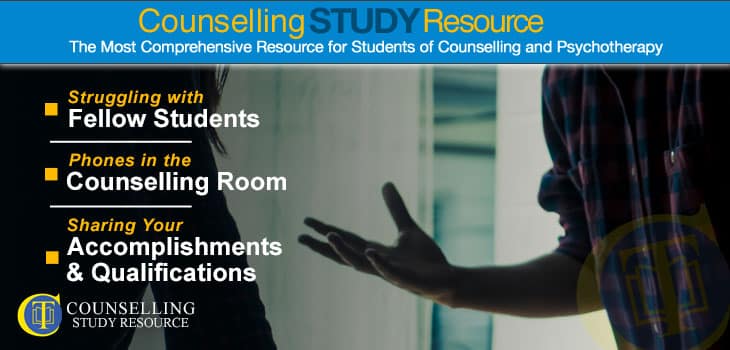091 – Struggling with Fellow Students – Phones in the Counselling Room – Sharing Your Accomplishments and Qualifications
In episode 91 of the Counselling Tutor Podcast, Ken Kelly and Rory Lees-Oakes offer tips on what to do if you feel you clash with another student in your group. In ‘Practice Matters’, Rory looks at the more sinister aspect of mobile phones in the therapy room. Last, the presenters discuss when, how and with whom you might choose to share your accomplishments and qualifications.
Struggling with Fellow Students (starts at 2.30 mins)
It is natural in any group of people that there will be clashes of personality. When starting counselling training, it is easy to assume that everyone will be like-minded, but in fact it’s usual to find a wide range of different views in any group of counselling students, just as you would in any other cross-section of society.
Ken and Rory offer tips on what you could do if you are struggling with another student on your course:
- First, look within: does the person remind you of anyone difficult from your past (if so, transference may be at work) or even of yourself (in which case, you may want to read about Carl Gustav Jung’s work on the shadow self)?
- Only then – if this doesn’t solve the problem – try to muster the courage to talk about it with the person. It’s important when doing this to use the core conditions, and not to blame the other person. For example, instead of saying, ‘You make me feel …’, you might say, ‘This is what comes up within me …’
- Remember that working with people you find difficult is really good training for working with a wide range of clients – who may exhibit some of the same traits. So don’t avoid working with anyone you struggle with on your course: in fact, make a beeline to do so! There’s far more learning in difficult than in easy situations.
- Consider looking at models of group dynamics, for example Bruce Tuckman’s team development stages (forming, storming, norming, performing and adjourning).
Phones in the Counselling Room (starts at 15.04 mins)
In episode 54 of the Counselling Tutor Podcast, Rory discussed what to do if clients check their mobile phones during sessions. Now, he turns to the more sinister side of phones in the counselling room: that is, when they are a vehicle for abusers of some type (e.g. through revenge porn). In this situation, a client bringing their phone into the therapy room may have the effect of bringing in the abuser too.
Rory draws on the work of Catherine Knibbs, specialist in ‘cybertrauma’ – a term she has coined to describe trauma from the online world. Cybertrauma may be immediate, delayed or retrospective – and may be either an event or a process.
Rory describes how clients affected by cybertrauma may present in the therapy room. Turning off their phones or leaving them outside the room can be hugely empowering for clients.
You can download Rory’s handout on this aspect of phones in the therapy room here; it is also available in the Handouts Vault and Counselling Study Resource (CSR).
Sharing Your Accomplishments and Qualifications (starts at 21.22 mins)
It’s natural to feel really proud of your hard-earned counselling qualifications: they are big achievements. Some people post pictures of their new certificates on our Counselling Tutor Facebook group, to share their good news and encourage others who might be at an earlier stage.
Your qualifications may be relevant to:
- your clients – though Ken reports that it’s rare for clients to ask to see these; putting them on display in your therapy room may affect the power balance, but you could have them available in a folder in case anyone wishes to look
- potential employers – as evidence on your CV of your knowledge and skills
- your professional body – which is likely to require evidence of your practitioner qualification and continuing professional development (CPD).
The CSR contains lots of lectures that you can use to add to your CPD, all within one monthly price. Plus, each lecture comes with a downloadable certificate as evidence of your learning activity.
Free Handout Download
Phones in the Counselling Room
